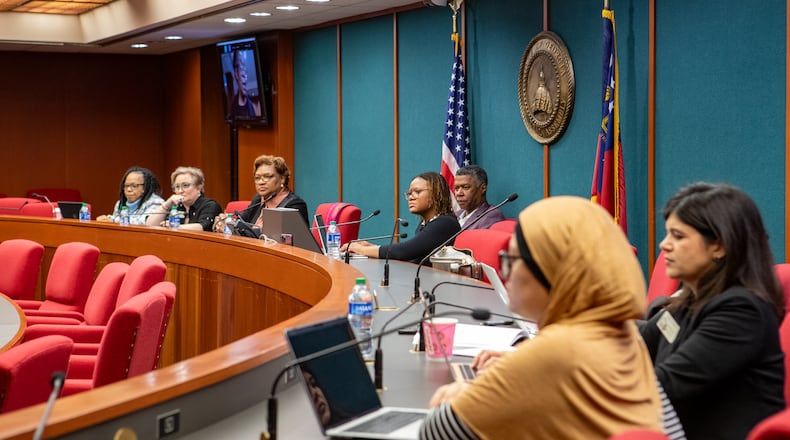With Georgia’s maternal mortality rates among the worst in the country, state lawmakers and advocates gathered on Thursday to share ideas and solutions to improve outcomes.
The Georgia House Democratic Caucus hosted a statewide public hearing at the Georgia Capitol seeking answers to decrease worsening infant and maternal mortality throughout the state.
Over a dozen public comments were given, with testimony coming from health providers, community leaders and mothers.
Some solutions suggested included Medicaid expansion, increasing education around maternal mortality prevention for providers, paid leave for mothers and reducing restrictions for midwives.
“The bottom line is women, specifically Black women who become pregnant in Georgia are dying, and that simply does not have to be so,” said Staci Fox, chief executive officer and president of the Georgia Budget and Policy Institute.
Georgia is one of 10 states to not expand Medicaid, the state-federal program that pays for health care for the poor, people with disabilities and many elderly patients. Because the state did not expand Medicaid, which was part of the Affordable Care Act, billions of federal dollars that are meant to support the state’s health systems are going unused. According to Fox, 46% of all births in Georgia are funded by Medicaid.
Georgia’s infant mortality increase last year was one of the four worst in the nation, with about seven babies dying for every 1,000 births.
In Georgia, 892 infants died in 2022, 116 more than the year before. U.S. infant deaths surpassed 20,500 in 2022 — 610 more than the year before. Black babies had the highest rate of death in the U.S., 10.86 per 1,000 births.
The number of babies born too early in Georgia has been steadily rising, a growing number of infants at risk for lifelong physical and intellectual disabilities, according to the March of Dimes.
“What we see is a continued pattern of indifference,” said Sandra Williams, president of the North Georgia Labor Council. “We know that the lack of health care and living in a state that refuses to expand Medicaid has a tremendous impact on poor people, but particularly poor Black women.”
Morehouse School of Medicine’s Center for Maternal Health Equity partnered with Emory University to form the Center to Advance Reproductive Justice and Behavioral Health among Black Pregnant/Postpartum Women and Birthing People. Dr. Natalie Hernandez-Green, executive director of the Morehouse center, leads the effort.
Hernandez-Green says the center is working to produce scientific evidence to help guide clinical care and reduce health disparities during and after pregnancy. This is part of the center’s overall mission of helping Black women survive and thrive through pregnancy and postpartum.
“People just need the right information at the right time, with the right resources to achieve equity,” Hernandez-Green said. " That’s what we’re hoping to do as we go out into these communities.”
Along with partnering with Morehouse School of Medicine’s center Georgia has taken steps such as extending Medicaid coverage from six to 12 months postpartum and implementing a Maternal Mortality Review Committee.
“We are failing our mothers. We are especially failing our Black mothers,” said Dr. Toby Terwilliger, a local physician and co-chair of the Georgia chapter of Physicians for a National Health Program. “If we want to right this grave injustice, we must invest in access to care.”
MATERNAL MORTALITY
Maternal mortality is measured as a ratio: the number of maternal deaths per 100,000 live births. This is Georgia’s maternal mortality rate over time. Data for maternal mortality is usually poor, but these numbers were determined by intensive investigation into case files by a state committee of experts. Experts caution that if investigative tools improve, the data may rise for that reason.
The majority of pregnancy-related deaths don’t happen in childbirth; they happen in the weeks and months after the patient gives birth.
Georgia’s Maternal Mortality Ratio per 100,000 births
2012-2015: 28
2015-2017: 25.1
2018-2020: 30.2
Maternal Mortality in Racial/Ethnic groups
Non-Hispanic white: 23.3
Non-Hispanic Black: 48.6
Source: Georgia Department of Public Health
LEADING CAUSES OF MATERNAL DEATH
The state Department of Public Health has released some initial findings from the review of Georgia’s maternal deaths between 2018 and 2020 by the Maternal Mortality Review Committee. These were the top ways in which the committee found pregnancy contributed to the death of someone who was pregnant or had given birth in the previous year.
16 deaths: Hemorrhage. All preventable.
15 deaths: Mental health conditions. All preventable.
13 deaths: Cardiomyopathy (a condition that affects how the heart pumps blood). All preventable.
12 deaths: Cardiovascular and coronary conditions. All preventable.
12 deaths: Embolism (an obstruction in an artery or a blood clot). Ten were preventable.
10 deaths: Preeclampsia and eclampsia. All preventable.
Source: Georgia Department of Public Health
The Atlanta Journal-Constitution and Report for America are partnering to add more journalists to cover topics important to our community. Please help us fund this important work at ajc.com/give
About the Author
Keep Reading
The Latest
Featured




